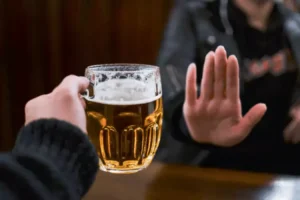
As in humans, primates with low CNS serotonergic activity exhibit behaviors indicative of impaired impulse control and unrestrained aggression. The studies reviewed here suggest that impaired serotonin functioning may increase the risk for aggression following alcohol consumption. Possibly, a common neurobiological mechanism, such as low serotonin production and turnover, underlies both excessive alcohol consumption and impulsive aggressive behavior.
The Right Treatment Facility
Alcohol intoxication refers to a temporary condition that occurs when a person drinks an excess of alcohol at one time. It causes physical and behavioral symptoms that range from mild to severe. A rare but very serious syndrome called delirium tremens can occur during alcohol withdrawal. Also known as DTs, an estimated 2% of people with alcohol use disorder and less than 1% of the general population experience them. Individuals who misuse alcohol may develop fitting when intoxicated. Fitting may also develop in alcohol-dependent individuals when they withdraw from alcohol.

Journal of Family Violence

A tremor, best brought out by extension of the hands or tongue, may appear. This tremor has a rate of six to eight cycles per second and appears on electromyography to be an exaggeration of normal physiologic tremor. The severity of these symptoms varies greatly among individuals, but in a in which stage of intoxication does an individual become aggressive or withdrawn and sleepy majority, they are mild and transient, passing within 1 to 2 days (10–12).
How does alcohol cause intoxication?
When a person drinks alcohol, ethanol passes through the digestive system and enters the bloodstream through the linings of the stomach and intestines. If an individual drinks alcohol on an empty stomach, their BAC usually peaks within 30–90 minutes. The good news is that it’s possible to survive alcohol intoxication if appropriate medical treatment is given promptly.
Such research in humans also poses problems, because difficulties arise in measuring underlying etiological mechanisms, such as variations in the activity of key chemicals in the brain and inherent biochemical differences that exist among people. In the case of alcohol, intoxication can lead to alcohol poisoning, increase the risk of vehicle accidents, and can increase a person’s risk for conditions such as cancer and cardiovascular problems. Unstable vital signs increase the risk of complications and can be managed with medications. People who experience severe withdrawal symptoms or DTs may require hospitalization or intensive care unit (ICU) treatment during alcohol. People with alcohol use disorder should be monitored by a medical professional when withdrawing from alcohol.
- These effects typically start to occur when alcohol reaches a certain percentage of a person’s bloodstream, known as their blood alcohol content (BAC).
- The episode may escalate to include fleeting hallucinations, illusions that arouse fear and restlessness, and disorientation with visual hallucinations that may be terrifying.
- A person’s intoxication level is measured by their blood alcohol concentration (BAC).
Signs of Intoxication
After an episode of alcohol intoxication, it takes time to recover. The person will be hospitalized until their vital https://ecosoberhouse.com/ signs return to normal. Alcohol intoxication occurs from drinking too much alcohol in a short period of time.
How much alcohol does it take to be intoxicated?

Alcohol-related hospital attendances and admissions continue to escalate despite a fall in alcohol consumption levels in the UK population overall. People with alcohol-related problems pose a significant and often disproportionate burden on acute medical services as their management is often complex and challenging. This article focuses on the management of alcohol intoxication, in which stage of intoxication does an individual become aggressive or withdrawn and sleepy with particular emphasis on aggressive and possibly violent behaviour; alcohol withdrawal; fitting; and the prevention and treatment of Wernicke’s encephalopathy. Treatment for alcohol intoxication involves supportive care while the body tries to process the alcohol. You must seek emergency medical treatment for a person who’s showing symptoms of alcohol poisoning.
This final phase leads to a complete loss of control over alcohol consumption—where the person feels they must drink.3 At this point, the individual’s body begins to require the presence of alcohol to feel normal, known as dependence. When the individual does not consume alcohol regularly, they may experience withdrawal symptoms and intense cravings. Some research suggests that people at risk of alcohol use disorder are less easily intoxicated than people who are not problem drinkers.

What are the symptoms of alcohol intoxication?
People with a BAC of 0.45 or higher are at serious risk of death due to respiratory depression and loss of other vital bodily functions. Death can occur at lower BAC levels, but the risk is significant at this level of intoxication. At Moving Mountains Recovery, our specialists provide high-quality, holistic treatment programs that allow people to live a healthy, sober lifestyle. Reach out to our admissions specialists to learn more about the alcoholism recovery programs we offer and how to get started. At Casa Palmera, our goal is to aid you in a comprehensive spiritual, physical, and emotional recovery.

The effects of alcohol use and offender remorsefulness on sentencing decisions
For example, measuring the role of alcohol expectancies on aggression in the non-verbal primate would be difficult. For severe cases of alcohol intoxication, your loved one may be kept in the hospital for observation. Even after being released, his body will still need to recover from the incident—it may affect mood, appetite, and brain function. While prompt medical treatment can help someone who is extremely intoxicated from alcohol, that is only a short-term solution. If a loved one is habitually struggling with alcohol intoxication, you must speak to him about alcohol rehabilitation treatment. A qualified, experienced treatment facility such as Casa Palmera offers exceptional recovery programs that can help your loved one work towards sobriety.